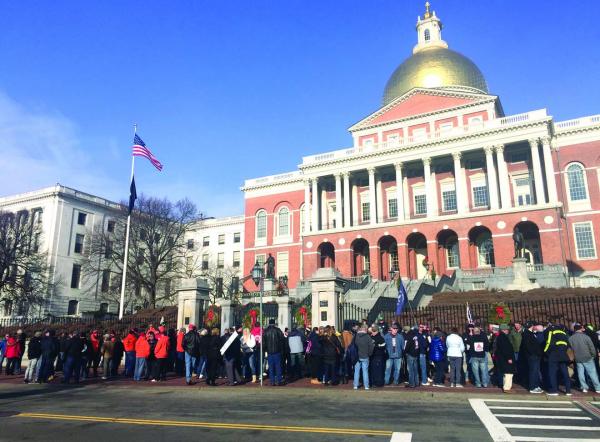January 10, 2019

National Grid workers visited Beacon Hill on Dec. 31 to urge Gov. Charlie Baker to sign a bill extending their unemployment benefits. The workers who have been locked out since June are now set to be back on the job later this month after their unions on Monday ratified a new agreement replacing their expired contract. Michael P. Norton/SHNS photo
Real estate developers are breathing a sigh of relief now that National Grid and its locked-out gas workers have reached a tentative labor agreement.
Some projects that would otherwise be complete have been on hold because developers can’t get gas service turned on. As new buildings sit vacant, the Massachusetts chapter of the National Association of Industrial and Office Properties (NAIOP) estimates losses in the tens of millions.
Even if unions ratify the deal, developers’ pain won’t be over immediately. NAIOP Massachusetts says it could take as long as two years to catch up on all the work National Grid has missed since the company locked out about 1,250 union workers last June.
The utility hired replacement workers to keep up with some jobs — but not all. And when a replacement crew injected too much pressure into a pipeline in Woburn in October, state regulators ordered National Grid to stop most of its projects for 10 weeks.
“This is essentially a crisis that’s been created over the past six months,” said Tamara Small, NAIOP Massachusetts’s senior vice president of government affairs.
The real estate group wants the Baker administration to lean on National Grid, much like it pressed Columbia Gas to restore service quickly, following that company’s pipeline disaster in the Merrimack Valley last fall.
“There should be timelines in place, so we can make sure that this backlog — which may be two years — is significantly shortened and that the projects can open, people can move into their homes, and people can get back to work,” Small said.
One place where people are waiting to move into their homes is the Acadia apartment complex in Chelsea, which features 34 units of affordable housing, including eight for people who are currently homeless.
It’s move-in ready — except it doesn’t have gas.
“Having that many households waiting to move in, after they’ve been selected, is a situation we’ve never had before,” said Rafael Mares, executive director of Neighborhood Developers, the nonprofit that built Acadia. “It is particularly heartbreaking to think that people spent the holidays homeless when they had an apartment waiting for them.”
Some other real estate developers have resorted to installing expensive propane-tank systems to heat their buildings. That’s what Newton-based National Development did on two projects, costing the firm tens of thousands of dollars.
“We’ve got another project that’s planned to open this spring,” said managing partner Ted Tye, “and [we] went into the winter not knowing: Could we lease it? Could we not lease it? When could we get occupancy? That was one where there was no alternative” heating option.
Tye still doesn’t have answers to these questions.
Uncertainty is a headache not only for developers but also for bankers, who loan money for real estate projects and expect repayment when tenants start renting.
Lenders are getting antsy, according to Greater Boston Real Estate Board President Greg Vasil.
“I mean, usually a lender would love to be able to ... have a date certain, you try to meet it, you hit it, boom,” Vasil said. “If you’re holding all these construction loans open, it just sort of looks bad on your books. It’s still a construction project but, theoretically, it’s all done. And I’m not making money on it; I can’t do anything with it because I can’t occupy it yet.”
It’s unclear when the locked-out National Grid workers will be back on the job. An approval vote was scheduled for last Monday. But after months of heated dispute, there could be a cooling-off period of one or two weeks before workers return.
This story first appeared on the website of WBUR 90.9FM on Jan. 3. The Reporter and WBUR have a partnership in which the two news organizations share content.


